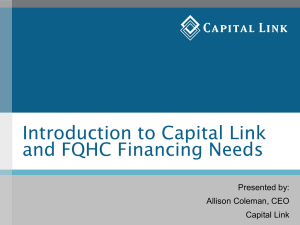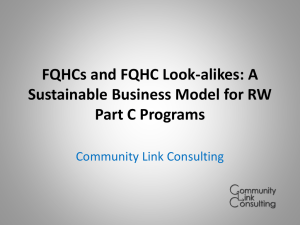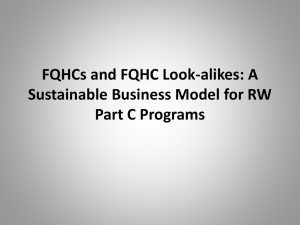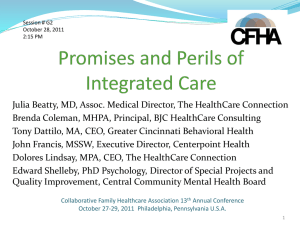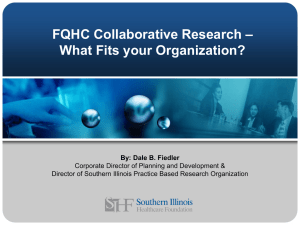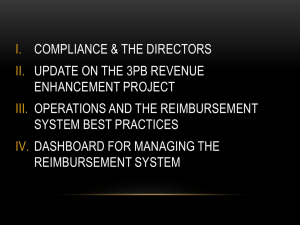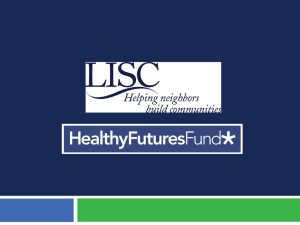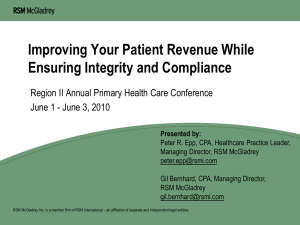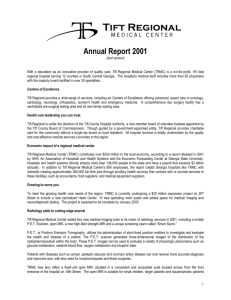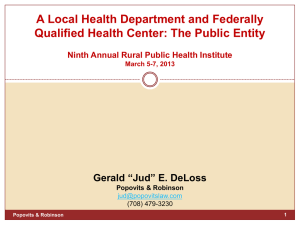TRMC-Presentation-4
advertisement
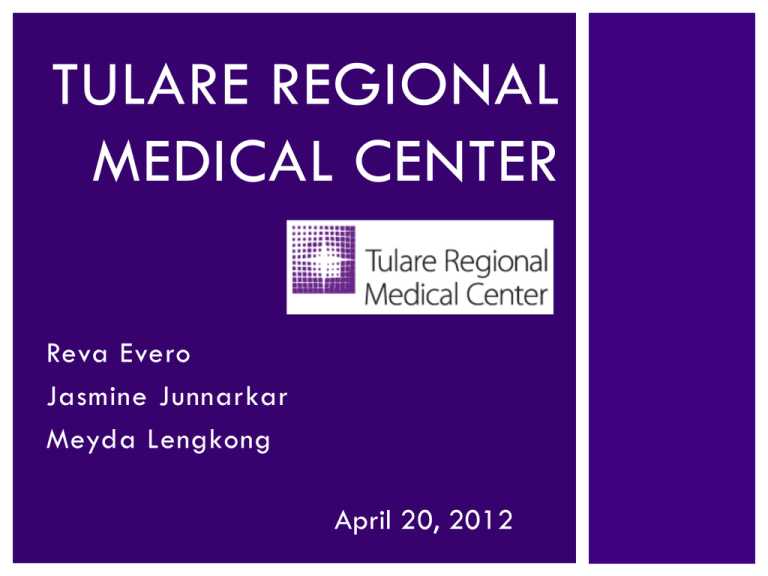
TULARE REGIONAL MEDICAL CENTER Reva Evero Jasmine Junnarkar Meyda Lengkong April 20, 2012 OUTLINE Background on Organization Summary of Recommendations Overview of Current TRMC Strategy Action Plans For Recommendations Impact of Healthcare Reform Conclusion BACKGROUND ON TRMC Tulare Regional Medical Center (TRMC) is facing challenges that include: 1. Competitive Pressure 2. Physician Staffing 3. Financial Strains SUMMARY OF RECOMMENDATIONS 1. Expansion of current partnerships with academic medical centers 2. A pilot project to convert a clinic into Federally Qualified Health Center (FQHC) through an alliance with the public health department 3. Value based Quality Improvement (QI) Program OVERVIEW OF CURRENT TMRC STRATEGY: IMAGE RENOVATION Investing in state-of-the-art buildings and equipment to attract new physicians and patients Partnering with other health care organizations Expanding presence in rural areas Focusing on community wellness RECOMMENDATION 1: PHYSICIAN STAFFING Action Plan: Expanding linkage between University of Southern California (USC) and TRMC Regain market share in select specialties through partnerships with USC Establish rural focused residency programs Revitalize image of TMRC as a leader in health care throughout the Central Valley RECOMMENDATION 1: PHYSICIAN STAFFING Specialists Draw: New Facility, Latest in Medical Technology Investing in Relationships with colleagues, leading physicians Demand for Services Primary Care Physician (PCP) Loan forgiveness Conversion to FQHC Demand for Services Patients Better Quality of Care More Access to Care RECOMMENDATION 2: FQHC CONVERSION Public Trust Community support for the conversion of FQHC Community Needs Assessment Partnership of TRMC with Tulare County public health department Enhance hospital reputation Local recognition for improving health status of community RECOMMENDATION 2: FQHC CONVERSION TRMC •Conversion of Rural Health Clinic (RHC) to Federally Qualified Health Center (FQHC) •Promotion of Evolution Fitness and Wellness Center Tulare County Public Health Department RECOMMENDATION 2: FQHC CONVERSION Facility TRMC Rural Health Clinic (RHC) Federally Qualified Health Center (FQHC) Federal Grants No Yes, up to $650,000 for new starts Medical malpractice coverage No Yes Medicare Payment Rates $78.54* Rural: $109.90* Urban: $ 126.98* Loan repayment and waiver of work visa for foreign MDs No Yes Benefits: •Adapted from Medicare Payment Advisory Commission (MedPAC), Report to Congress: Medicare and the Health Care Delivery System (2011) www.medpac.gov/chapters/Jun11_Ch06.pdf *Cited from Centers for Medicare & Medicaid Services (CMS), Announcement of Medicare Rural Health Clinic (RHC) and Federally Qualified Health Centers (FQHC) Payment Rate Increases (2012) www.ngsmedicare.com/ RECOMMENDATION 2: FQHC CONVERSION Requirements of FQHC Current TRMC RHC Private non-profit or public organization ✔ Serving medically underserved areas ✔ Comprehensive primary health care services ✔ Minimum service hours of 32 hours per week ✔ Professional call coverage during closing hours ✔ Maintain a core staff to provide necessary services ✔ Majority of board members are users of center ✖ •Adapted from Medicare Payment Advisory Commission (MedPAC), Report to Congress: Medicare and the Health Care Delivery System (2011) www.medpac.gov/chapters/Jun11_Ch06.pdf RECOMMENDATION 2: FQHC CONVERSION Education of Federally Qualified Health Center (FQHC) to leadership in TRMC Formation of FQHC steering committee and appointment of board members November Implementation of FQHC pilot program in one 2012 RHC November Evaluation of pilot project and house wide 2013 expansion of project May 2012 August 2012 RECOMMENDATION 2: FQHC CONVERSION •Adapted from Office of Statewide Health Planning and Development (OSHPD), 2010 Tulare Regional Medical Center Annual Financial Disclosure Report http://siera.oshpd.ca.gov/annualfinancial.aspx RECOMMENDATION 3: QI PROGRAM Action Plan: Develop an organization wide Quality Improvement (QI) program in anticipation of Medicare Hospital Value-based Purchasing RECOMMENDATION 3: QI PROGRAM FY 2011 Medicare Patient Revenue Medicare Traditional Medicare Managed Total Net Inpatient Revenue $12,823,051 $1,597,507 $14,420,558 FY 2013 FY 2014 FY 2015 FY2016 FY 2017 Percent Reduction 1% 1.25% 1.5% 1.75% 2% Potential Loss $144,206 $180,257 $216,308 $252,360 $288,411 Total $1,081,542 •Adapted from Office of Statewide Health Planning and Development (OSHPD), 2011 Tulare Regional Medical Center Annual Financial Disclosure Report http://siera.oshpd.ca.gov/annualfinancial.aspx RECOMMENDATION 3: QI PROGRAM System wide change thru: Defining quality metrics based on Center for Medicare and Medicaid Service (CMS) measures Facilitate physician and staff involvement Utilization of new health information system Holding departments accountable Monthly review of quality performance Quarterly review of financial metrics Incentivize meeting performance targets RECOMMENDATION 3: QI PROGRAM Culture of shared responsibility Dynamic learning Hospital wide involvement Open communication Motivation to improvement System Wide Quality Improvement Commitment to meeting performance targets RECOMMENDATION 3: QI PROGRAM Establishes TRMC as a leader in quality within the community 1. Increases physician and staff alignment 2. Improves coordination of patient care 3. Improves hospital efficiency 4. Reduces waste and associated costs IMPACT OF HEALTHCARE REFORM Uncertainties Principles • Quality Healthcare Reform • Value • Vertical Integration Recommendations 1) Expansion of partnership with Academic Medical Center 2) Alliance with Tulare County Public Health for FQHC conversion 3) Quality Improvement program using HIS Outcomes Increased quality Increased value Increased vertical integration CONCLUSION PHYSICIANS TRMC FQHC Quality Improvement Quality Customer Service Compliance/Ethics Finance/Efficiency People Growth Community
